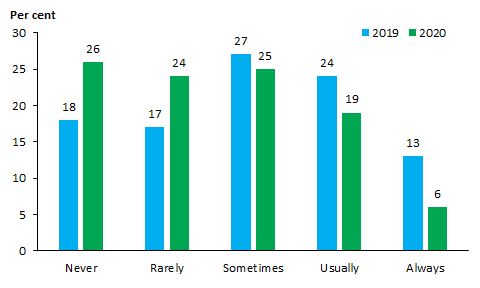Priority Area 6: Reducing stigma and discrimination
The Fifth Plan states the following will be different for consumers and carers:
- • There will be a better understanding of mental illness and improved attitudes towards people with mental illness.
Experiencing stigma and discrimination remains common for people with mental illness, both in healthcare settings and in the broader community.
In 2020, around one-quarter (26%) of respondents said they or the person they care for ‘usually’ or ‘always’ get treated differently by their mental health care provider because of their mental illness, compared to 38% of respondents in 2019 (Figure PA6). A further 50% of respondents reported they, or the person they care for, ‘never’ or ‘rarely’ experienced being treated differently when accessing mental health services in 2020, compared to 35% in 2019.
In 2020, 38% of respondents reported that they or the person they care for were ‘usually’ or ‘always’ treated differently in the community because of their mental illness, compared to 43% in 2019.
These apparent changes appear promising, however due to the limitations of the survey it is not possible to know if the changes are caused by real improvements in the experience of consumers and carers or whether they are the result of different people responding to the 2019 and 2020 surveys.
Of the consumers who opted to provide additional information in this priority area, 20% reported experiencing stigma and/or discrimination when seeking mental health support from the health system. Of the carers who opted to provide additional information in this priority area, 14% indicated that the person they care for had experienced stigma and/or discrimination when seeking mental health support from the health system. For both consumers and carers, emergency departments were the most commonly mentioned service where stigma and discrimination were experienced when seeking mental health support.
Of the consumers who opted to provide additional information in this priority area, 14% reported being discriminated against in the workplace, and 16% reported not disclosing or actively trying to hide their mental illness in a range of settings to avoid discrimination and stigma.
Figure PA6: Frequency of being treated differently due to mental illness, when accessing mental health services in the past 12 months, 2019 and 2020





